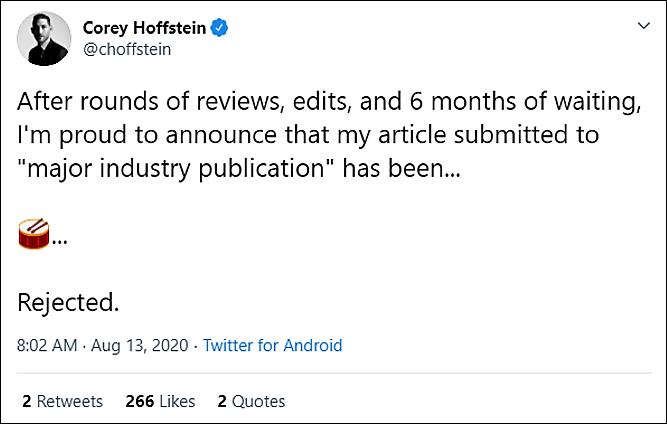
A few days ago, we read a tweet from Corey Hoffstein saying that after a six month review process, an academic journal decided not to publish an investment research paper written by Corey and two colleagues.
We reached out to Corey and team to see if they would be interested in publishing their research on Epsilon Theory, and today we’re delighted to publish Rebalance Timing Luck: The Dumb (Timing) Luck of Smart Beta, by Corey Hoffstein, Nathan Faber and Steven Braun.
We think this is an important paper. Here’s why.
Sensible-sounding abstractions, sometimes acknowledged perfunctorily and sometimes considered so self-evidently reasonable as to be passively accepted, are the bane of social science research and are at the heart of the reproducibility crisis – the frequent inability to duplicate the findings of published research.
This is especially true in financial markets.
Studies of systematic investment strategies and factors are far more sensitive to assumptions about rebalancing, time horizons, rolling windows, calculation methods, etc. than researchers are typically willing to indicate in their papers, and as a result their conclusions usually need to be taken with a substantial grain of salt.
We think this paper is an excellent illustration of how this phenomenon plays out in smart beta benchmarks, and it might have been buried forever if there were no alternative to academic journals and an inherently flawed peer-review process.
So we’re not stopping here.
Epsilon Theory is more than happy to occasionally publish academic research of merit pertaining to financial and political markets.
If you have something that you think expands our collective understanding of those markets, send it to us at [email protected].
Why are we committed to publishing academic research?
Because we think the peer review process of academic journals cannot avoid embedding bias in paper selection.
We think peer review is useful, and that the vast majority of peer reviewers are serious and ethical people. But in the social sciences in particular, we also think that methodology and priors are often inextricably linked. That means that what you think the answer will be influences how you set up the problem and how you try to answer it. That also means that what you want the answer to be may affect whether you, as a reviewer or editor, think the methodology used by another to explore the question is sound. We believe that the peer review process often rejects papers on the superficial basis of methodology and rigor when the true underlying basis is dissatisfaction with its conclusion, problem framing or priors.
Because we think academic research in finance tends to be excessively backward-looking.
We think there is an emphasis in academic finance on empirical studies of asset prices, security-level fundamental characteristics and quantitative economic variables that do a magnificent job of creating an explanation for things that happened and not much else. There is a role for this sort of economic history, but it is a bit part, and not the leading role we have made it. There are reasons why financial markets research tends to not reflect live testing of hypotheses like it absolutely could, and most of that reason is “because we’d usually end up with nothing to write about.”
Because academic journals’ focus on novelty weakens collective understanding.
For commercial and philosophical reasons, academic journals in the social sciences prioritize the publishing of entirely novel research and topics. It is an understandable aim, but one that doesn’t always serve the expansion of the collective understanding of important topics. In our experience, finding new ways to illustrate a truth is every bit as important as discovering it in the first place. Ditto for trying out a hypothesis and finding that the empirical evidence does NOT support that hypothesis.
Because we think our readers are smart enough to evaluate this research on their own.
We think that journals have a legitimate challenge in determining how to accept or reject papers. There are a LOT of submissions. Some submissions are better than others. We think that good people truly do their best to publish the higher quality papers, but we also think that reputation and credentials play a role in these decisions. If, say, Harry Markowitz decides to send you a new paper, you keep your red pen in your damned desk drawer. But what’s true at that extreme is true in the in-between as well: there are reasons that a paper might be rejected or accepted, edited or taken as-is, that sometimes have nothing to do with its importance or quality. We think you’re smart enough and capable enough to decide on the usefulness of research for yourself.
A few ground rules …
We can’t commit to publishing everything. Your paper might be objectively bad. Your paper might be objectively incomprehensible. And by objectively, we mean subjectively to Rusty and Ben.
We can’t commit to giving you feedback and comments on a paper that you send us, whether we publish it or not.
We can’t commit to timing on any of this. Some weeks we’ll be really quick on this, and other weeks we’ll be swamped with other stuff.
We absolutely, positively will NOT commit to publishing your corporate white papers.
But if we don’t publish your academic research on financial or political markets, it will never be because we don’t like the conclusions, the topic, or the methodology.
It will never be because you don’t have a certain set of academic credentials or a certain set of academic connections.
And if we do publish your research paper, our commitment to you is this:
- We won’t charge you anything, ever.
- We won’t put it behind a pay wall.
- We won’t edit or modify it.
- We won’t keep you from publishing it somewhere else, and if getting it published somewhere else means you need us to take it down here, we’ll do that, too.
- We will make it visible and searchable, and we will give it access to our network of 100,000+ investment professionals, asset owners, academics and market enthusiasts.
There are many institutional gatekeepers. There are many powerful guilds and socially embedded practices that seek to limit our voices and ideas. Are academic journals the worst of these? Not by a long shot. But they ARE one of these.
This is how we change the world. This is how we unleash our voices and ideas. Not by attacking these institutional gatekeepers from the top-down with yet another institutional gatekeeper, but by making the institutional gatekeeper irrelevant through our bottom-up, decentralized actions.
Will making academic journals irrelevant save the world? No.
But it’s a good start.










Kudos, Ben and Rusty. I’m looking forward to the hidden gems that will be unearthed on ET.
Too often this happens: you point out a problem and the immediate response (usually from someone who benefits from the problem existing) points to you and shouts “if it’s such a big deal why don’t you do something about it?”. Well, you guys continue to do something about it. For that reason alone ET pack members should feel good knowing that we are collectively furthering the cause of clear eyes, full hearts.
BH/RG: You make excellent points about ‘academic’ publishing. (Good luck going outside the mainstream view (bracketing bias)!) However, to be fair, the authors: Hoffstein, Faber, and Braun will have had some reply with content from the Rejector, and to the extent that is allowed to be seen, that content should also be included, even if the identity of the Rejector is not included. VK